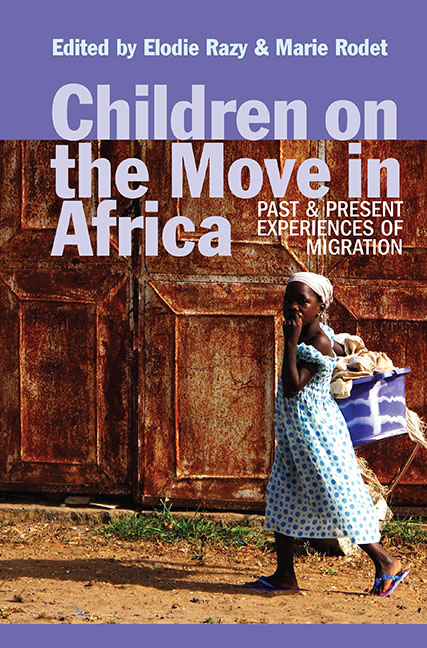Book contents
- Frontmatter
- Contents
- List of Illustrations
- Notes on Contributors
- Preface
- Acknowledgements
- Introduction: Child Migration in Africa: Key Issues & New Perspectives
- Part I CHILD MIGRANTS IN AFRICA: BEYOND THE DILEMMA OF VULNERABILITY v. AGENCY
- Part II BEING A CHILD & BECOMING A GENDERED ADULT: THE CHALLENGES OF MIGRATIONS IN CHILDHOOD
- Part III MOBILITY, IMAGINATION & MAKING NATIONS
- Bibliography
- Index
Preface
Published online by Cambridge University Press: 25 October 2017
- Frontmatter
- Contents
- List of Illustrations
- Notes on Contributors
- Preface
- Acknowledgements
- Introduction: Child Migration in Africa: Key Issues & New Perspectives
- Part I CHILD MIGRANTS IN AFRICA: BEYOND THE DILEMMA OF VULNERABILITY v. AGENCY
- Part II BEING A CHILD & BECOMING A GENDERED ADULT: THE CHALLENGES OF MIGRATIONS IN CHILDHOOD
- Part III MOBILITY, IMAGINATION & MAKING NATIONS
- Bibliography
- Index
Summary
In this provocative and timely collection the contributors direct our attention to the difficulties encountered when categorizing, analysing and interpreting African children's movements. How do we find child migrants? Where do we look for them? What does it mean to be a child migrant? How do we weigh vulnerability against agency? How do we conceptualize the migratory experience of the (un)accompanied minor? How is an African migrant child's legal subjectivity constituted before moving from the origin country or region? And how is it reconfigured when s/he arrives in migrant-receiving countries? Drawing on the rich and deeply personal experiences of African children spanning more than a century to the present day, Children on the Move in Africa explores how national and supra-national contexts shape and reshape the subjectivity of child migrants in subtle ways, with important implications for understanding the historical processes of identity formation and contemporary child protection regimes and practices.
The movement of African peoples across African borders is a defining feature of the late twentieth-century and early twenty-first-century experience. Today, advocates for greater mobility trumpet the upsurge as a logical outcome of increasing contemporary globalization; it operates as another story heralding the triumph of freedom in a neo-liberal epoch. But embedded in these dramatic changes are the lived experiences of thousands and millions of African children, many of whom relocate unaccompanied by parents or kin. Focusing on the complex experiences of children in contexts as diverse as forced migration, voluntary movement seeking wage-labour, education and various forms of bondage, slavery and trafficking – and drawing on documentation in colonial archives, personal letters, oral testimonies, published fiction, as well as in post-independence government and non-governmental agency reports – this anthology documents the shifting legal conceptualizations of African child migration from the mid-nineteenth century to the present day. The way legal regimes afford greater or lesser protections to children – in various contexts as diverse as imperial France, colonial Ghana or contemporary Nigeria – is deeply tied to the framing language describing the processes and practices of migration.
The phrase ‘child migrant’ is, in many popular connotations or deployments, a conundrum, maybe even an oxymoron. On the one hand, the word ‘child’ infers minority and thus a diminished capacity or complete incapacity to convey consent.
- Type
- Chapter
- Information
- Children on the Move in AfricaPast and Present Experiences of Migration, pp. xi - xiiPublisher: Boydell & BrewerPrint publication year: 2016

